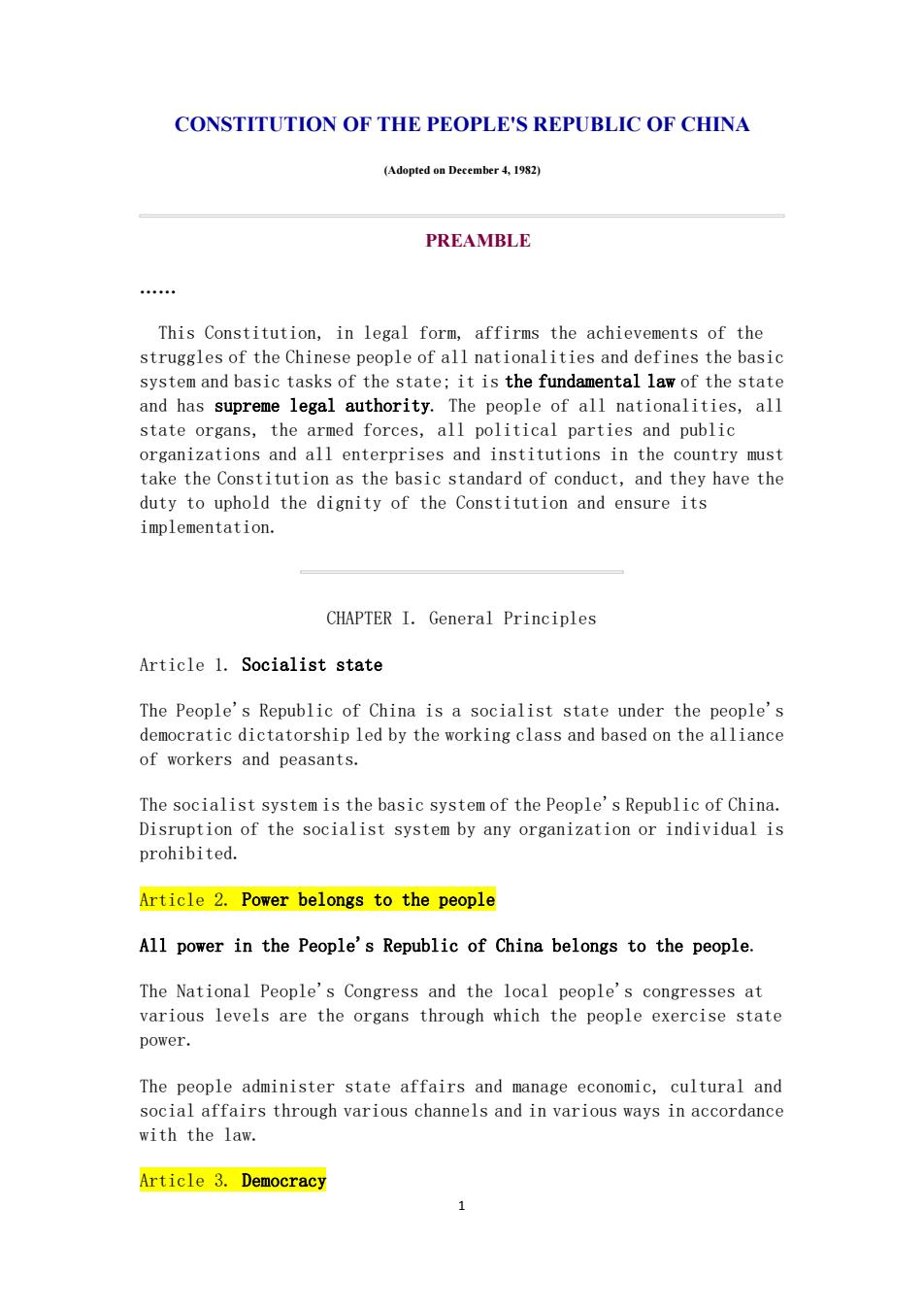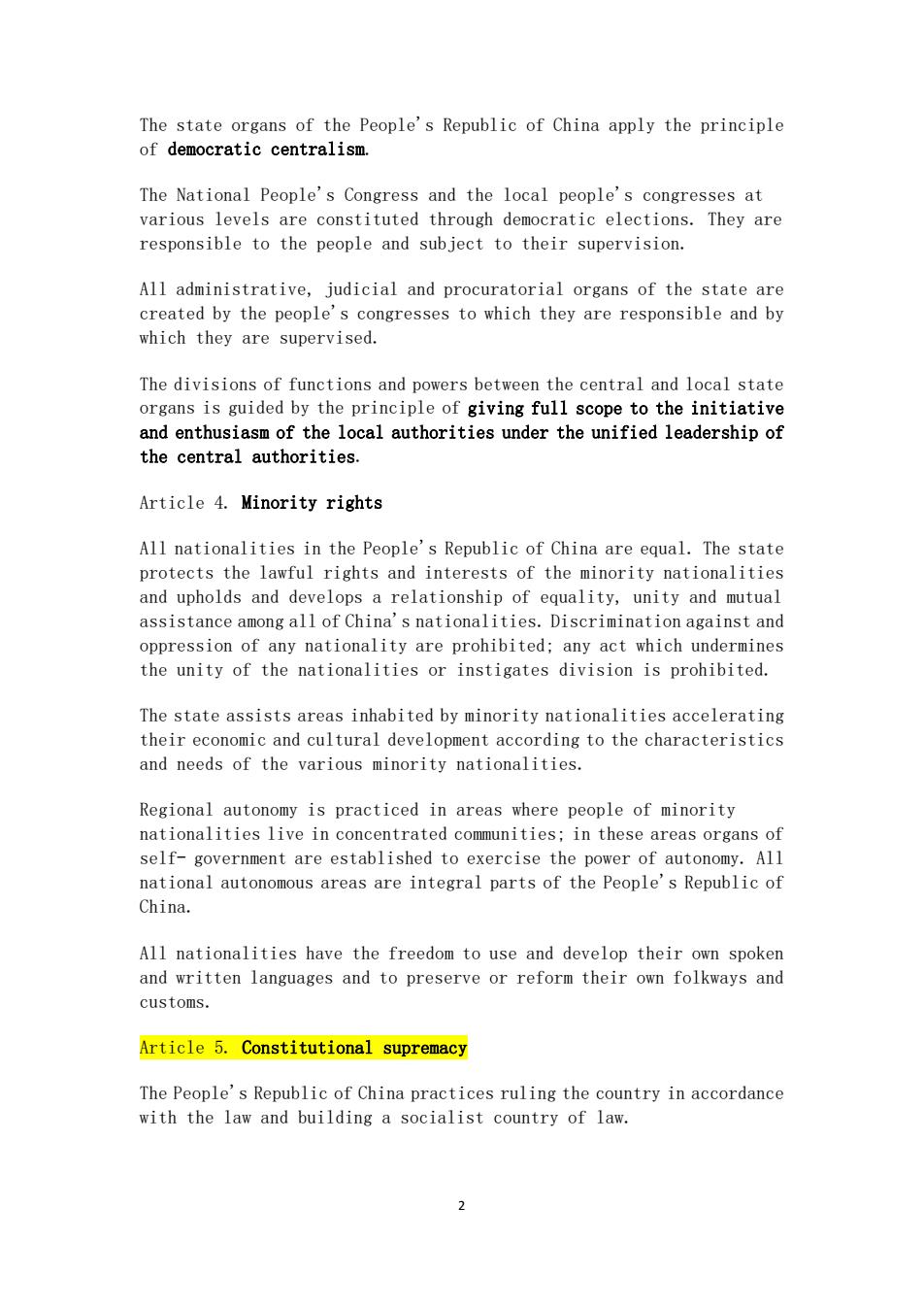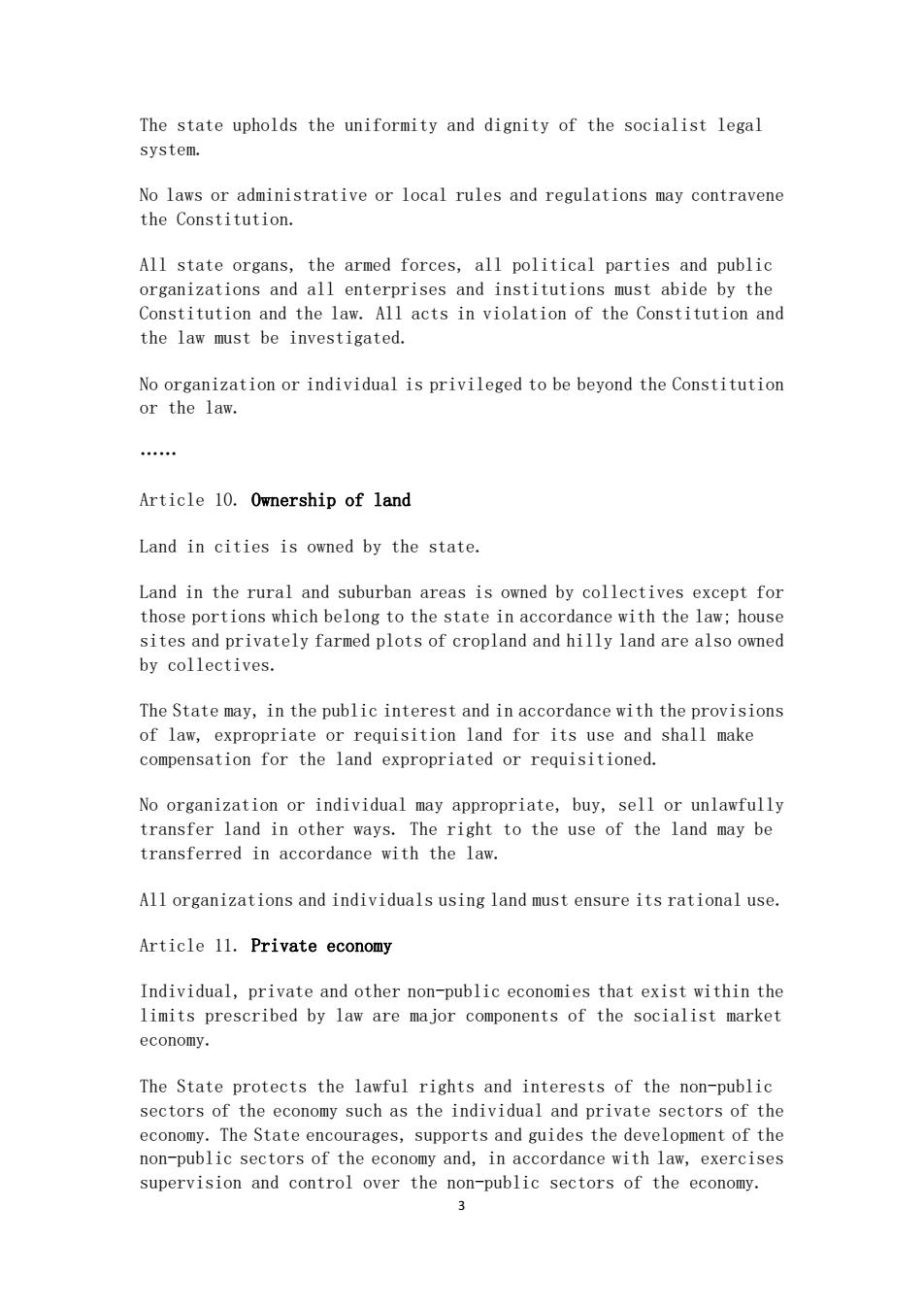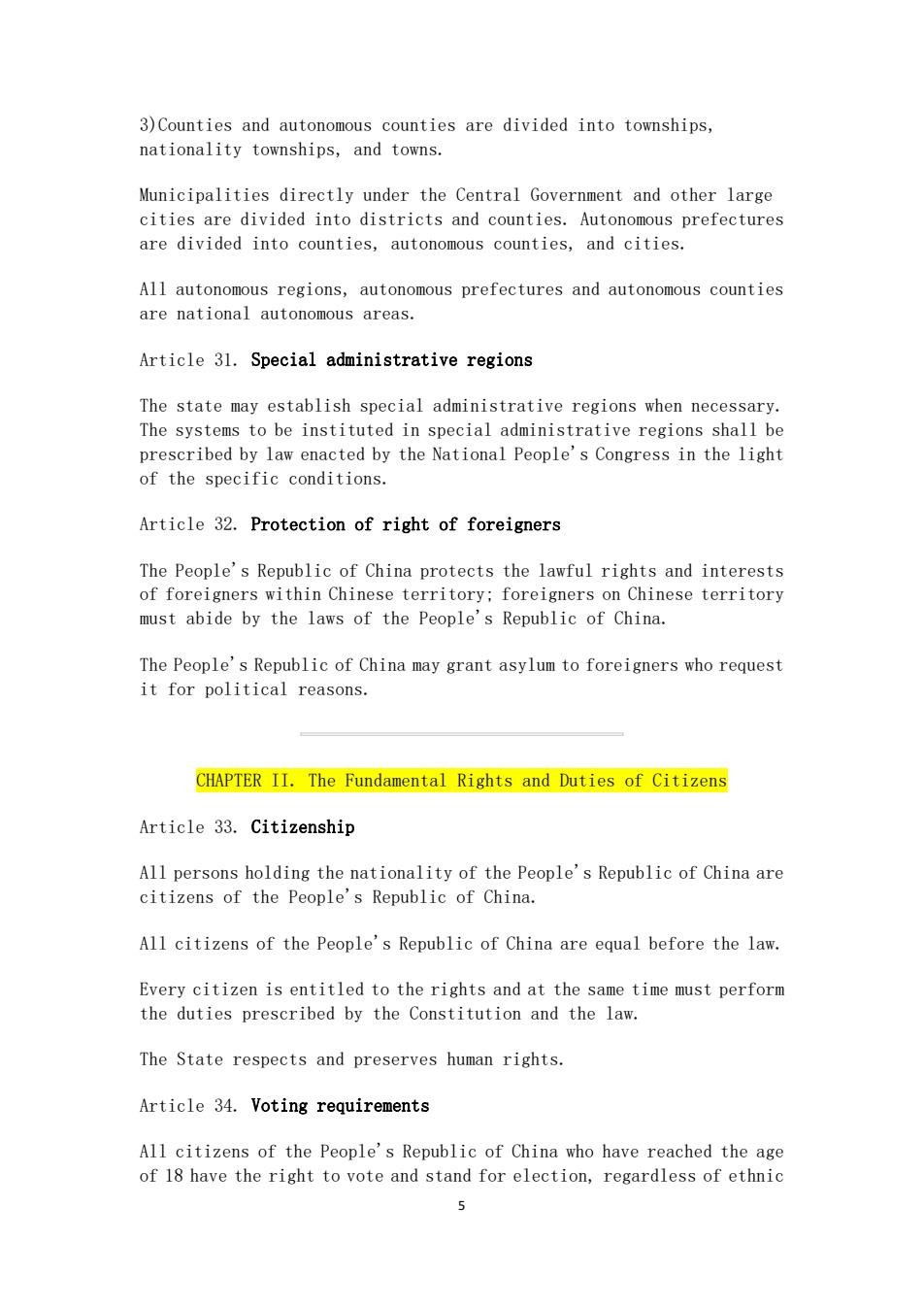
CONSTITUTION OF THE PEOPLE'S REPUBLIC OF CHINA (Adopted on December 4,1982) PREAMBLE This Constitution,in legal form,affirms the achievements of the struggles of the Chinese people of all nationalities and defines the basic system and basic tasks of the state;it is the fundamental law of the state and has supreme legal authority.The people of all nationalities,all state organs,the armed forces,all political parties and public organizations and all enterprises and institutions in the country must take the Constitution as the basic standard of conduct,and they have the duty to uphold the dignity of the Constitution and ensure its implementation. CHAPTER I.General Principles Article 1.Socialist state The People's Republic of China is a socialist state under the people's democratic dictatorship led by the working class and based on the alliance of workers and peasants. The socialist system is the basic system of the People's Republic of China. Disruption of the socialist system by any organization or individual is prohibited. Article 2.Power belongs to the people All power in the People's Republic of China belongs to the people. The National People's Congress and the local people's congresses at various levels are the organs through which the people exercise state power. The people administer state affairs and manage economic,cultural and social affairs through various channels and in various ways in accordance with the law. Article 3.Democracy
1 CONSTITUTION OF THE PEOPLE'S REPUBLIC OF CHINA (Adopted on December 4, 1982) PREAMBLE …… This Constitution, in legal form, affirms the achievements of the struggles of the Chinese people of all nationalities and defines the basic system and basic tasks of the state; it is the fundamental law of the state and has supreme legal authority. The people of all nationalities, all state organs, the armed forces, all political parties and public organizations and all enterprises and institutions in the country must take the Constitution as the basic standard of conduct, and they have the duty to uphold the dignity of the Constitution and ensure its implementation. CHAPTER I. General Principles Article 1. Socialist state The People's Republic of China is a socialist state under the people's democratic dictatorship led by the working class and based on the alliance of workers and peasants. The socialist system is the basic system of the People's Republic of China. Disruption of the socialist system by any organization or individual is prohibited. Article 2. Power belongs to the people All power in the People's Republic of China belongs to the people. The National People's Congress and the local people's congresses at various levels are the organs through which the people exercise state power. The people administer state affairs and manage economic, cultural and social affairs through various channels and in various ways in accordance with the law. Article 3. Democracy

The state organs of the People's Republic of China apply the principle of democratic centralism. The National People's Congress and the local people's congresses at various levels are constituted through democratic elections.They are responsible to the people and subject to their supervision. All administrative,judicial and procuratorial organs of the state are created by the people's congresses to which they are responsible and by which they are supervised. The divisions of functions and powers between the central and local state organs is guided by the principle of giving full scope to the initiative and enthusiasm of the local authorities under the unified leadership of the central authorities. Article 4.Minority rights All nationalities in the People's Republic of China are equal.The state protects the lawful rights and interests of the minority nationalities and upholds and develops a relationship of equality,unity and mutual assistance among all of China's nationalities.Discrimination against and oppression of any nationality are prohibited;any act which undermines the unity of the nationalities or instigates division is prohibited. The state assists areas inhabited by minority nationalities accelerating their economic and cultural development according to the characteristics and needs of the various minority nationalities. Regional autonomy is practiced in areas where people of minority nationalities live in concentrated communities;in these areas organs of self-government are established to exercise the power of autonomy.All national autonomous areas are integral parts of the People's Republic of China. All nationalities have the freedom to use and develop their own spoken and written languages and to preserve or reform their own folkways and customs. Article 5.Constitutional supremacy The People's Republic of China practices ruling the country in accordance with the law and building a socialist country of law
2 The state organs of the People's Republic of China apply the principle of democratic centralism. The National People's Congress and the local people's congresses at various levels are constituted through democratic elections. They are responsible to the people and subject to their supervision. All administrative, judicial and procuratorial organs of the state are created by the people's congresses to which they are responsible and by which they are supervised. The divisions of functions and powers between the central and local state organs is guided by the principle of giving full scope to the initiative and enthusiasm of the local authorities under the unified leadership of the central authorities. Article 4. Minority rights All nationalities in the People's Republic of China are equal. The state protects the lawful rights and interests of the minority nationalities and upholds and develops a relationship of equality, unity and mutual assistance among all of China's nationalities. Discrimination against and oppression of any nationality are prohibited; any act which undermines the unity of the nationalities or instigates division is prohibited. The state assists areas inhabited by minority nationalities accelerating their economic and cultural development according to the characteristics and needs of the various minority nationalities. Regional autonomy is practiced in areas where people of minority nationalities live in concentrated communities; in these areas organs of self- government are established to exercise the power of autonomy. All national autonomous areas are integral parts of the People's Republic of China. All nationalities have the freedom to use and develop their own spoken and written languages and to preserve or reform their own folkways and customs. Article 5. Constitutional supremacy The People's Republic of China practices ruling the country in accordance with the law and building a socialist country of law

The state upholds the uniformity and dignity of the socialist legal system. No laws or administrative or local rules and regulations may contravene the Constitution. All state organs,the armed forces,all political parties and public organizations and all enterprises and institutions must abide by the Constitution and the law.All acts in violation of the Constitution and the law must be investigated. No organization or individual is privileged to be beyond the Constitution or the law. …0… Article 10.Ownership of land Land in cities is owned by the state. Land in the rural and suburban areas is owned by collectives except for those portions which belong to the state in accordance with the law;house sites and privately farmed plots of cropland and hilly land are also owned by collectives. The State may,in the public interest and in accordance with the provisions of law,expropriate or requisition land for its use and shall make compensation for the land expropriated or requisitioned. No organization or individual may appropriate,buy,sell or unlawfully transfer land in other ways.The right to the use of the land may be transferred in accordance with the law. All organizations and individuals using land must ensure its rational use. Article 11.Private economy Individual,private and other non-public economies that exist within the limits prescribed by law are major components of the socialist market economy. The State protects the lawful rights and interests of the non-public sectors of the economy such as the individual and private sectors of the economy.The State encourages,supports and guides the development of the non-public sectors of the economy and,in accordance with law,exercises supervision and control over the non-public sectors of the economy. 3
3 The state upholds the uniformity and dignity of the socialist legal system. No laws or administrative or local rules and regulations may contravene the Constitution. All state organs, the armed forces, all political parties and public organizations and all enterprises and institutions must abide by the Constitution and the law. All acts in violation of the Constitution and the law must be investigated. No organization or individual is privileged to be beyond the Constitution or the law. …… Article 10. Ownership of land Land in cities is owned by the state. Land in the rural and suburban areas is owned by collectives except for those portions which belong to the state in accordance with the law; house sites and privately farmed plots of cropland and hilly land are also owned by collectives. The State may, in the public interest and in accordance with the provisions of law, expropriate or requisition land for its use and shall make compensation for the land expropriated or requisitioned. No organization or individual may appropriate, buy, sell or unlawfully transfer land in other ways. The right to the use of the land may be transferred in accordance with the law. All organizations and individuals using land must ensure its rational use. Article 11. Private economy Individual, private and other non-public economies that exist within the limits prescribed by law are major components of the socialist market economy. The State protects the lawful rights and interests of the non-public sectors of the economy such as the individual and private sectors of the economy. The State encourages, supports and guides the development of the non-public sectors of the economy and, in accordance with law, exercises supervision and control over the non-public sectors of the economy

4… Article 13.Private property,inheritance Citizens'lawful private property is inviolable. The State,in accordance with law,protects the rights of citizens to private property and to its inheritance. The State may,in the public interest and in accordance with law, expropriate or requisition private property for its use and shall make compensation for the private property expropriated or requisitioned. Article 18.Foreign investment The People's Republic of China permits foreign enterprises,other foreign economic organizations and individual foreigners to invest in China and to enter into various forms of economic cooperation with Chinese enterprises and other Chinese economic organizations in accordance with the law of the People's Republic of China. All foreign enterprises,other foreign economic organizations as well as Chinese-foreign joint ventures within Chinese territory shall abide by the law of the People's Republic of China. … Article 25.Family planning The state promotes family planning so that population growth may fit the plans for economic and social development. Article 30.Governmental divisions The administrative division of the People's Republic of China is as follows: 1)The country is divided into provinces,autonomous regions and municipalities directly under the Central Government; 2)Provinces and autonomous regions are divided into autonomous prefectures,counties,autonomous counties,and cities; 4
4 …… Article 13. Private property, inheritance Citizens' lawful private property is inviolable. The State, in accordance with law, protects the rights of citizens to private property and to its inheritance. The State may, in the public interest and in accordance with law, expropriate or requisition private property for its use and shall make compensation for the private property expropriated or requisitioned. …… Article 18. Foreign investment The People's Republic of China permits foreign enterprises, other foreign economic organizations and individual foreigners to invest in China and to enter into various forms of economic cooperation with Chinese enterprises and other Chinese economic organizations in accordance with the law of the People's Republic of China. All foreign enterprises, other foreign economic organizations as well as Chinese-foreign joint ventures within Chinese territory shall abide by the law of the People's Republic of China. …… Article 25. Family planning The state promotes family planning so that population growth may fit the plans for economic and social development. …… Article 30. Governmental divisions The administrative division of the People's Republic of China is as follows: 1)The country is divided into provinces, autonomous regions and municipalities directly under the Central Government; 2)Provinces and autonomous regions are divided into autonomous prefectures, counties, autonomous counties, and cities;

3)Counties and autonomous counties are divided into townships, nationality townships,and towns. Municipalities directly under the Central Government and other large cities are divided into districts and counties.Autonomous prefectures are divided into counties,autonomous counties,and cities. All autonomous regions,autonomous prefectures and autonomous counties are national autonomous areas. Article 31.Special administrative regions The state may establish special administrative regions when necessary. The systems to be instituted in special administrative regions shall be prescribed by law enacted by the National People's Congress in the light of the specific conditions. Article 32.Protection of right of foreigners The People's Republic of China protects the lawful rights and interests of foreigners within Chinese territory;foreigners on Chinese territory must abide by the laws of the People's Republic of China. The People's Republic of China may grant asylum to foreigners who request it for political reasons. CHAPTER II.The Fundamental Rights and Duties of Citizens Article 33.Citizenship All persons holding the nationality of the People's Republic of China are citizens of the People's Republic of China. All citizens of the People's Republic of China are equal before the law. Every citizen is entitled to the rights and at the same time must perform the duties prescribed by the Constitution and the law. The State respects and preserves human rights. Article 34.Voting requirements All citizens of the People's Republic of China who have reached the age of 18 have the right to vote and stand for election,regardless of ethnic 5
5 3)Counties and autonomous counties are divided into townships, nationality townships, and towns. Municipalities directly under the Central Government and other large cities are divided into districts and counties. Autonomous prefectures are divided into counties, autonomous counties, and cities. All autonomous regions, autonomous prefectures and autonomous counties are national autonomous areas. Article 31. Special administrative regions The state may establish special administrative regions when necessary. The systems to be instituted in special administrative regions shall be prescribed by law enacted by the National People's Congress in the light of the specific conditions. Article 32. Protection of right of foreigners The People's Republic of China protects the lawful rights and interests of foreigners within Chinese territory; foreigners on Chinese territory must abide by the laws of the People's Republic of China. The People's Republic of China may grant asylum to foreigners who request it for political reasons. CHAPTER II. The Fundamental Rights and Duties of Citizens Article 33. Citizenship All persons holding the nationality of the People's Republic of China are citizens of the People's Republic of China. All citizens of the People's Republic of China are equal before the law. Every citizen is entitled to the rights and at the same time must perform the duties prescribed by the Constitution and the law. The State respects and preserves human rights. Article 34. Voting requirements All citizens of the People's Republic of China who have reached the age of 18 have the right to vote and stand for election, regardless of ethnic